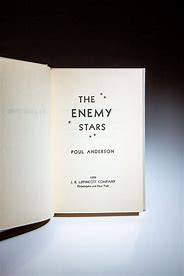The Enemy Stars, 10.
Four men face possible imminent death. Nakamura contemplates Zen paradoxes. Ryerson reverts to his inherited Calvinism. Sverdlov looks at photographs of his mistresses. (God, if He exists, understands that it takes all sorts.) Maclaren asks:
"'Perhaps fear is a necessary part of anything that matters. Could Bach have loved his God so magnificently without being inwardly afraid of Him? I don't know.'" (p. 76)
My answer is no but this is Maclaren's question.
Poul Anderson sympathetically treats both theists and non-theists. (Non-theists include Taoists and Buddhists as well as secularists.) How do the experiences of theists and non-theists converge - or diverge? My best formulation is this: monotheist prayer is a real or imagined dialogue with a transcendent person. Jewish prophetic experience is such a dialogue in the history of a people. A Holocaust survivor said that God went into the camps with us and came out of them with us. (He paralleled this with the Resurrection.) Theists reflect on their experience and interpret some of their reflections as responses from a person. What we have in common is that we reflect on life and death.

5 comments:
Kaor, Paul!
I don't think the "fear of God" has to always be understood in negative ways. Proverbs 9.10 says: "The fear of the Lord is the beginning of wisdom; and the knowledge of the holy is prudence." Awe before the splendor, power, and majesty of God is right and appropriate. But God has also revealed Himself in far gentler ways, as when He spoke to Elias not in terrifying signs and wonders but in the "whistling of a gentle air" (3 Kings 19.12).
And I thought Taoists did believe in God or gods.
Ad astra! Sean
Sean,
Awe, yes.
From what I have read, Taoist philosophy and Taoist religion are entirely distinct with different founders! The religion copied Buddhism by having a Trinity with a Jade Emperor at the top, then Lao Tsu (founder of the philosophy) and Chuang Tzu (I think) who controls yin-yang interactions. Lao Tzu's philosophy in the Tao Te Ching refers to an impersonal Tao or Way.
Paul.
Also, while fear is inevitable you don't have to let fear -affect- you. Properly regarded, fear is simply a physical sensation, which you can 'feel' without it affecting your mind.
DUNE: Litany against Fear.
Kaor, Paul and Mr. Stirling!
Paul: I was vaguely going by what I recalled of Taoism from Robert van Gulik's Judge Dee mystery, THE HAUNTED MONASTERY, set in a Taoist monastery. And of how the Confucian Judge Dee was inclined to disapprove of both Taoism and Buddhism.
Mr. Stirling: I agree fear is a sensation which might or might not be controlled by the person feeling it. I've been seeing a lot of that in your BLACK CHAMBER books, where Luz O'Malley has to make sure fear did not get in the way of doing what needs to be done.
Ad astra! Sean
Post a Comment